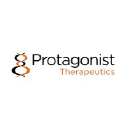Companies
Discover all trending biotech companies
Discover all trending biotech companies

Company Research Platform
Annual Revenue
$ 28,320,000
Global Employees
124
This segment focuses on the research, development, and clinical trials of peptide-based therapeutics for hematological conditions and blood disorders. The primary focus is on rusfertide (PTG-300), a hepcidin mimetic being developed to treat polycythemia vera and hereditary hemochromatosis. Research and development activities include preclinical studies, Phase II clinical trials, and formulation development. The technology platform utilizes peptide synthesis and screening to identify and optimize drug candidates. The goal is to improve patient outcomes by providing effective and targeted therapies for blood disorders, addressing unmet medical needs. Market positioning involves strategic partnerships, such as the collaboration with Takeda, to advance the development and commercialization of rusfertide. Future opportunities include expanding the application of hepcidin mimetics to other blood disorders. Regulatory and clinical aspects involve navigating FDA approval processes and conducting clinical trials to demonstrate safety and efficacy.
This segment concentrates on the development of peptide-based therapeutics for the treatment of inflammatory bowel disease (IBD). The primary focus is on PN-943, an oral, alpha-4-beta-7 integrin-specific antagonist peptide, and PN-235, an orally delivered interleukin-23 receptor specific antagonist. Research and development activities include Phase II clinical trials, formulation development, and exploring new indications. The technology platform leverages peptide chemistry and screening to identify and optimize drug candidates. The aim is to improve the quality of life for IBD patients by providing effective and targeted therapies. Market positioning involves strategic partnerships, such as the collaboration with Janssen Biotech, to advance the development and commercialization of these therapies. Future opportunities include expanding the application of these therapies to non-IBD indications. Regulatory and clinical aspects involve navigating FDA approval processes and conducting clinical trials to demonstrate safety and efficacy.